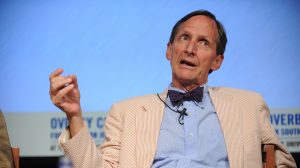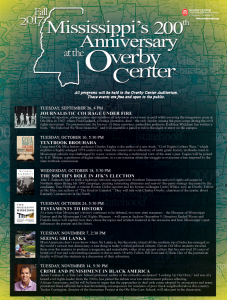
Tom Oliphant, a former Boston Globe reporter, will return to campus to discuss ‘The Road to Camelot,’ a book he wrote with Overby fellow Curtis Wilkie. Photo by Robert Jordan/Ole Miss Communications
OXFORD, Miss. – The Overby Center for Southern Journalism and Politics begins its 11th year at the University of Mississippi with emphasis on the state’s 200th birthday and a program about the role of journalists during the crisis surrounding the integration of the school 55 years ago.
The opening program, at 4 p.m. Tuesday (Sept. 26), is built around journalism professor Kathleen Wickham’s new book, “We Believed We Were Immortal.” The presentation will include a short film about a reporter slain during the all-night riot – the only fatality suffered among journalists who covered the civil rights movement through the 1960s – as well as a conversation between three well-known figures at Ole Miss.
Wickham will be joined in the discussion by Don Cole, UM assistant provost. Douglass Sullivan-Gonzales, dean of the Sally McDonnell Barksdale Honors College, will serve as moderator.
“The fall programs at the Overby Center will reveal fresh insights into some historic issues,” said Charles Overby, chairman of the center. “These programs once again reaffirm that William Faulkner was right about the past not being past.”
Free and open to the public, the discussion and all the remaining fall events are in the Overby Center auditorium.
The talk will be preceded by an eight-minute film about Paul Guihard, the French journalist who was shot and killed during the turmoil. The mystery surrounding his death has never been solved. The film was prepared by Mykki Newton, a former television journalist and staff member at the university’s Meek School of Journalism and New Media.
Tuesday’s event will be followed by five other programs during the fall semester:
– Oct. 10, 5:30 p.m. – Charles Eagles, a longtime member of the history faculty at Ole Miss, will discuss his new book, “Civil Rights Culture Wars,” with K.B. Melear, professor of higher education. Eagles’ book deals with a controversy that spanned much of the 1970s over efforts to introduce a new textbook that fully chronicles Mississippi’s troubled racial history into public high schools in the state. Earlier textbooks sugarcoated slavery and glorified the Confederacy.
– Oct. 18, 5:30 p.m. – John F. Kennedy’s audacious plan to win Southern support in 1960 by courting prominent segregationists in the region, while at the same time trying to enlist civil rights activists in Northern states, will be the subject of a conversation with Tom Oliphant and Overby fellow Curtis Wilkie, who worked together as journalists for the Boston Globe for more than a quarter-century and are co-authors of a new book, “The Road to Camelot.” Charles Overby will act as moderator.
– Oct. 24, 5:30 p.m. – Six weeks before the dedication the Museum of Mississippi History and the Mississippi Civil Rights Museum, the directors of both museums, Rachel Myers and Pamela Junior, will talk about how they chose the topics and artifacts to be featured in the facilities at a time when Mississippi’s history continues to be debated.
– Nov. 7, 2:30 p.m. – A group of Ole Miss students, along with Overby fellow Bill Rose and Ji Hoon Heo of the journalism faculty who accompanied them, will discuss their summer trip to Sri Lanka and their work to produce a magazine and video presentations about the exotic land where an ancient culture has survived a brutal civil war and a disastrous tsunami in recent years.
– Nov. 14, 5:30 p.m. – James Forman Jr., a Yale Law School professor, author of the critically-acclaimed “Locking Up Our Own” and son of a prominent civil rights leader, will discuss his belief that some approaches adopted by prosecutors and African-Americans to control crime actually have had a devastating impact in poor black communities. He will be joined in the conversation by Tucker Carrington, director of the Innocence Project at the UM School of Law.
For more information about the Overby Center, visit http://overbycenter.org/.
